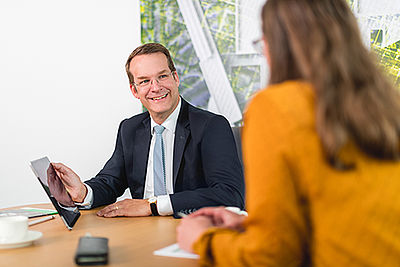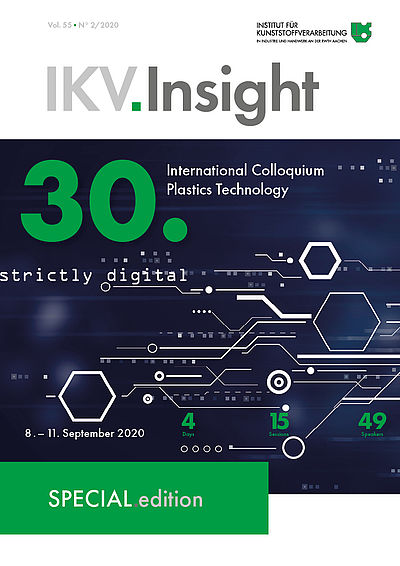Professor Hopmann, why will the established International Colloquium Plastics Technology and the new Plastics Technology Symposium go digital in this anniversary year?
Prof. Hopmann: The decision to offer the 30th International Colloquium Plastics Technology and the International Symposium on Plastics Technology as digital events was taken in mid-June. The deciding factor was the concern for the health of the participants and of our own staff, because it cannot be assumed that the COVID-19 pandemic will be fully overcome by the autumn.
We now see the situation as an opportunity to demonstrate our digital competence. I am convinced that we will manage to stage both events with a high information value and make them well worthwhile for the participants. Apart from the fact that the technical content of the programme will naturally be up to the customary high level, there will also be a virtual substitute for the Colloquium’s supporting programme.
What do the programmes look like for the two virtual events?
Prof. Hopmann: The programme of lectures at the Colloquium and Symposium will be transmitted in their entirety by video streaming. Another integral part of the programme will be the subsequent discussion rounds with all participants, during which the listeners can put their questions directly to the speakers.
The real visit to the Institute within the context of “IKV 360°” will, at the 2020 Colloquium, become a virtual guided tour with demonstrations of innovative projects and up-and-running processes at around 80 stations from all IKV’s areas of research. We are also looking forward to the entertaining “best-of Beer Colloquiums”, in which we will show the best scenes from “Beer Colloquiums” through 70 years of IKV.
As far as the recruiting event organised in the last few years parallel to the Colloquium is concerned, we are currently working on the best way to carry it out. At present, we are still at the clarification phase and establishing how attractive it would be for the companies from our network to hold digital interviews with candidates.
What changes will result for the participants from the new concept?
Prof. Hopmann: In order to take account of the special situation with virtual participants sitting in front of their PCs all over the world, we have spread the programme of lectures over four afternoons from 2 to 5.30 p.m. (CET) instead of two full days. Two sessions instead of three will run in parallel and all of them will also be available in English. With the new concept we will allow in particular international guests to participate in the event without complications, not least because the change of time of the programme will take into account the different time zones. A very positive aspect for all the participants is that they can ‘attend’ more lectures overall as a result of the restructuring.
We will this year dispense with organising the industry trade show that normally takes place in parallel with the Colloquium as well as the table-top exhibition at the Symposium. Such shows flourish – like trade fairs – from direct contact and cannot simply be turned into a digital format. The benefit that exhibitors and visitors might derive from a digital version of the industry trade show seemed to us during the planning stage not to be adequate. We will therefore concentrate this year on the programme of lectures at the Collo-quium and Symposium and on the 360° tour of the Institute facilities and the evening event – which, in the virtual world, naturally does not have to be tied to the evening hours. All exhibitors and visitors can, however, be assured that we will again have an industry trade show on the agenda at the 2022 Colloquium.
The demands connected with the digital implementation of two events of this kind certainly present you with a number of challenges. What for you are the biggest?
Prof. Hopmann: We naturally want to offer our participants a programme that is as comprehensive and as attractive as possible – just as it would be if the event were live. It is ob-vious that this will not be possible without a great deal of ef-fort. Especially in the short time we have available since the final decision was taken, it will not be easy to successfully master all the tasks in time. Merely the technical realisation of a conference of this scale is a challenge in itself. But I am confident that we can do it – the staff are motivated and are regularly feeding their ideas into the project. We are all pulling together. This, in combination with our digitisa-tion strategy, means that I can look forward to the new Col-loquium format with determined composure, as Professor Michaeli always recommended in critical moments.
What are you yourself particularly looking forward to and what are you most excited about?
Prof. Hopmann: First of all, the primary goal of our current preparations for the Colloquium is to make the great variety of visionary and practical research topics virtually tangible for the professional audience. At the top of the agenda is also the creation of optimal conditions for comfortable networking, i.e. you as a visitor should be able to communicate with your business partners and IKV experts conveniently and in real time, even in digital format. For this purpose, we have developed a virtual interaction and communication platform exclusively for the participants of the Colloquium, on which the scientists of our institute will present the whole range of IKV research. In this context I am especially looking forward to seeing how receptive the plastics segment is to digital platforms, but most of all – as at every Colloquium – I am looking forward to the meetings and discussions with our visitors. And, of course, to watching the most entertaining scenes from our “Beer Colloquium” media library.


